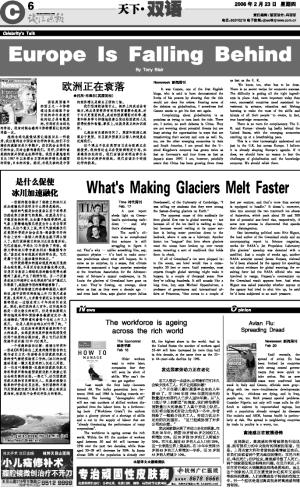据说英国最早的国王之一卡努特通过显示海浪不会听他的命令来表明他的权力是有限度的。听到有关全球化的争论,我有时候会感到卡努特需要让他的脚再湿一次。
抱怨全球化就像试图让海浪回头一样徒劳。我注意到在中国没有这样的争论。他们不怕潜在的威胁而是只争朝夕,抓住机会去转变他们的社会,同时也影响着我们。同样,亚洲和南美洲的新兴国家也在那样做。我很自豪地看到自从1997年以来联合王国的经济增长是德国的两倍,日本的四倍。然而,令我无奈的是中国的经济增长是联合王国的三倍。
我们很清楚该做什么。经济上的成功没有秘方。难点是要将所有有用的要素整合起来。对于今天更重要的是,成功的国家需要对科学、教育和终身学习持续地投资以使这些国家的人民获得技能和智慧。事实上,这就是真正的知识经济。
已经没有自满的空间了。英国和欧洲已经落后于美国,而且新兴国家正以惊人的速度在赶超我们。
这个观点不仅在英国而且在全欧洲正在被接受。我相信这也正在使欧洲制定计划。如果确实如此的话,我们应该没有理由害怕全球化和知识经济的挑战。我们应该乐于迎接这样的挑战。
Newsweek 新闻周刊
It was Canute, one of the first English kings, who is said to have demonstrated the limits of his powers by showing that the tide would not obey his orders. Hearing some of the debates on globalization, I sometimes feel Canute needs to get his feet wet again.
Complaining about globalization is as pointless as trying to turn back the tide. There are, I notice, no such debates in China. They are not worrying about potential threats but are busy seizing the opportunities in ways that are transforming their society and ours as well. So, too, are the other emerging economies in Asia and South America. I am proud that the United Kingdom's economy has grown twice as fast as Germany's and four times as fast as Japan's since 1997. I am, however, painfully aware that China has been growing three times as fast as the U. K.
We know, too, what has to be done. There is no secret recipe for economic success. The difficulty is getting all the right ingredients in place. And, more important today than ever, successful countries need sustained investment in science, education and lifelong learning to make the most of the skills and talents of all their people—to create, in fact, true knowledge economies.
There is no room for complacency. The U.K. and Europe—already lag badly behind the United States, with the emerging economies catching up at a breathtaking pace.
This is a view increasingly understood not just in the U.K. but across Europe. I believe it is already shaping Europe's agenda. If it does, we should have no reason to fear the challenges of globalization and the knowledge economy. We should relish them.

